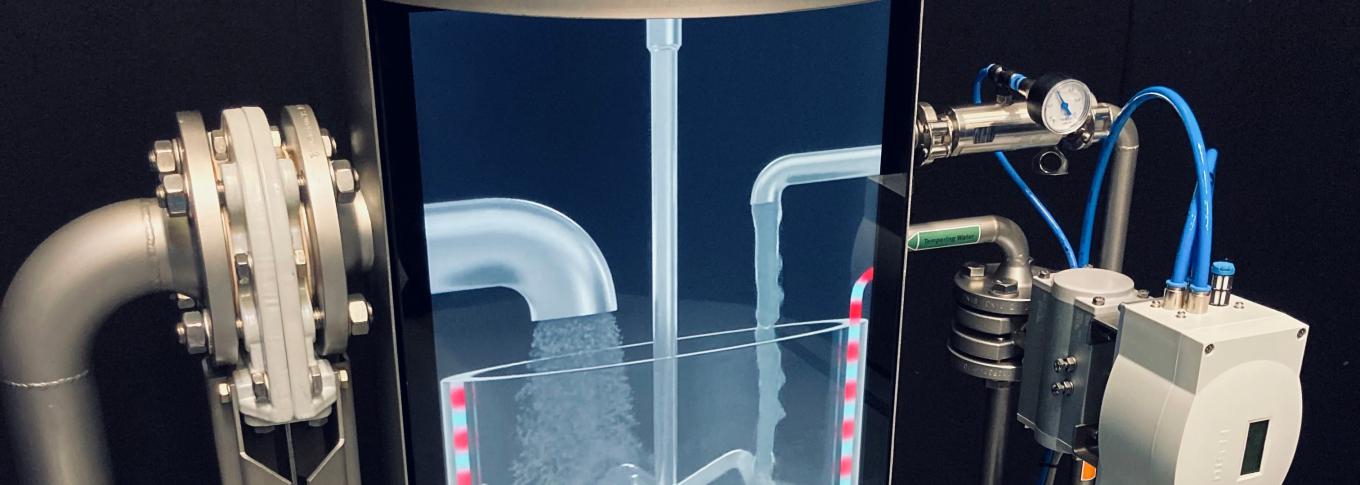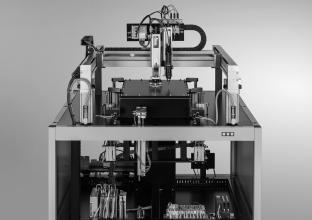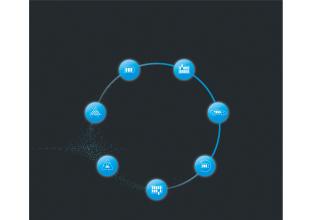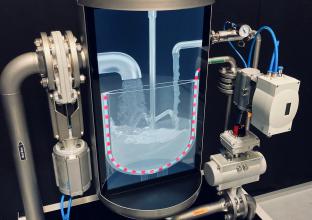
Recycling rare minerals economically
According to estimates, by 2025 some 600,000 tons of used batteries from electric passenger cars need to be recycled. Since batteries are energy storage devices made from valuable raw materials, this inevitably raises the question of sustainability. Festo therefore offers modular automation concepts not only for cell producing, assembling battery modules and packs, and platform integration, but also for disassembling and recycling or separating the materials.
After around 1500 charging and discharging cycles, i.e. after about 160,000 kilometers in 8 to 10 years, the batteries of electric cars are hardly profitable anymore. The reason: compared to the new system, the reduced charging capacity of the batteries considerably shortens the range. However, a residual capacity of around 80% gives the batteries a second life, for example as part of a battery farm. With increasing automation of dismantling, the recycling process is becoming more flexible and dynamic, which also means that material is available for recycling more quickly. Festo is driving this development forward with a view to its vision of a sustainable circular economy.
In addition, proper disposal has already become mandatory in many states and countries. In Europe, the EU Battery Directive requires manufacturers to recycle or return batteries. Recycling is also mandatory in the US state of California.
Automated recycling
However, before used vehicle batteries are recycled, they are removed from the vehicle and used in so-called "battery farms" or stationary storage systems, for example. At the end of a battery's life, however, it must be professionally recycled. The first step is to mechanically dismantle the packs into modules, battery cells and other components - until now a manual, difficult and time-consuming task. Festo already offers modular automation concepts that speed up and simplify this process.
The next step is to recover valuable lithium, cobalt, manganese and nickel from used batteries and reuse them for the production of new batteries. Automated recycling processes enable these rare minerals to be reused economically and cleanly. Festo has the right recipes for this.
Most batteries in electric vehicles are lithium-ion batteries. Their proper disposal is important in order to avoid risks to people and the environment. New concepts for recycling and recovering raw materials support the industry in this. Various combinations of mechanical, pyrometallurgical and hydrometallurgical processes are used to recycle battery materials. The hydrometallurgical recycling process, for example, is a chemical precipitation method using acid. Rare minerals are extracted from the black mass as metal salt. These minerals are supplied to battery manufacturers who reuse them for the production of new batteries.
Dismantling systems for modules and packs
Special factory systems are already being planned for these tasks. Festo has already developed and presented its first mechanical modular disassembly system for battery modules and packs. Both handling and gripper systems as well as proven components from Festo's pneumatic and electric automation portfolio are used.
Festo is also already looking to the future of electromobility: It is involved in research into manufacturing concepts for new types of solid-state batteries. Experts predict that these even more powerful storage systems will replace the current lithium-ion batteries in the coming years.
Requirements of the new giga-factories for production sites
Large areas, good transport connections, low development costs and a secure and sustainable energy supply are important prerequisites that are usually found far away from urban centers. An important aspect is having enough skilled personnel. The conversion to electromobility will not only create new factories, but also new tasks, fields of activity and job profiles. Employees need to be educated and trained for this.
Qualification necessary
Festo Didactic provides targeted training programs. Here, employees receive the know-how that is needed in highly automated production. The offer includes practical hands-on training in the plants, the establishment of in-house learning factories and digital learning content that can be accessed on the Festo Learning Experience (Festo LX) at any time and from any location - including on the topic of sustainability.
Festo is a global player and an independent family-owned company with headquarters in Esslingen am Neckar, Germany. Festo has set standards in industrial automation technology and technical education ever since its establishment, thereby making a contribution to sustainable development of the environment, the economy and society. The company supplies pneumatic and electrical automation technology to 300,000 customers of factory and process automation in over 35 industries. Digitalization, AI and the LifeTech sector with medical technology and laboratory automation are becoming increasingly important. The products and services are available in 176 countries. With about 20,600 employees in over 250 branch offices in around 60 countries worldwide, Festo achieved a turnover of around €3.45 billion in 2024. More than 8% of this turnover is invested in research and development. In this learning company, 1.5 % of turnover is invested in basic and further training. Festo Didactic SE is a leading provider of technical education and training and offers its customers worldwide comprehensive digital and physical learning solutions in the industrial environment.



